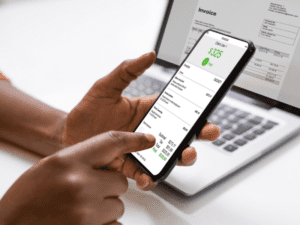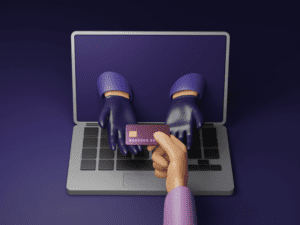Podcast: Play in new window | Download
Welcome back to ‘The Property Management Show,’ where we deep-dive into the world of property management, marketing, and entrepreneurship.
Your hosts are Marie Tepman and Brittany Jones from Fourandhalf Marketing Agency. Since 2012, Fourandhalf has helped hundreds of property managers get more owner leads through digital marketing. Whether you need help with your website, SEO, online reputation, content, video, social media, or even advertising campaigns – we can do it all.
Our guest today is Jordan Bennett, who is the Senior Director of Network Risk Management at Nacha, and a former Risk Analyst at the Federal Reserve. We are discussing ACH fees and payment fraud, and to put the entire discussion into better context, we asked Jordan to explain what his job entails.
 Management Payment Risks
Management Payment Risks
Nacha is the rule-making body and trade association for ACH payments. They are always promoting ACH, and Jordan’s job is thinking about how to prevent risk. He wants to keep people’s money in their accounts, and he wants to stop the schemes that can rob them of that money.
Not only does he want to make payments safe, but he also wants to educate consumers on the fact that ACH is one of the safest payment methods they can choose in the U.S. He works with banks and companies to decide how to utilize it and better manage any risks that may be present.
ACH Transaction Fees
For the longest time, ACH has been popular because it’s free. It’s always been the free option versus credit cards, where consumers have to pay transaction fee. Some companies, however, are beginning to charge transaction fees for ACH payments.
Why is this shift happening?
Jordan reminds us that there has always been a cost to run an ACH system. It’s a low cost because it’s a batch system, so it doesn’t cost as much as credit cards, which operate on an interchange system.
With ACH, there’s a lower cost to the financial institution and the property manager who is accepting the payment, but there is still a cost to running the network. So, it makes sense that a property manager and their financial institution may want to recoup these fees.
A lot of systems and anti-fraud tools and infrastructure needs to be maintained with ACH. It’s never been free (even though the customers see it as free).
Nacha cannot suggest or encourage or discourage fees. With antitrust laws what they are, Nacha cannot tell an industry whether they should or should not charge a fee. However, it’s important to remember that this process does not automatically happen. People get paid to do their jobs, and it takes jobs to keep these payments safe.
What we don’t want to do is set a precedent where it’s preferable to pay with a check to avoid the ACH fee.
 Consumers who do not want their information available and want the convenience of an ACH transfer will continue to use this method and not return to the days of using checks. Even from a management company or HOA perspective, accepting checks means you physically have to open an envelope and process the payment every time it’s made. If you have hundreds of rent checks coming in, that’s going to take time and require personnel. There will be a transaction cost regardless of how the payments come in. Your check fees may be higher from the bank than the ACH transfer fee.
Consumers who do not want their information available and want the convenience of an ACH transfer will continue to use this method and not return to the days of using checks. Even from a management company or HOA perspective, accepting checks means you physically have to open an envelope and process the payment every time it’s made. If you have hundreds of rent checks coming in, that’s going to take time and require personnel. There will be a transaction cost regardless of how the payments come in. Your check fees may be higher from the bank than the ACH transfer fee.
Property managers should not encourage checks. When a check is paid, the consumer knows they have money in their account, but they may forget. And, if that check takes a few days to get through the mail and be deposited, the consumer might have forgotten about the rent check that was written and they’ll spend the money that’s in the account. Everything could bounce.
That’s an unnecessary risk that landlords and property managers don’t have to take. ACH can be a regular recurring payment that comes out every month on the same day. It takes a few minutes to set up, but once it’s there – it’s there. Unlike checks, there’s not another entire process every month.
Checks have routing and account information printed right on them. It’s an opportunity for fraud. When an employee is processing an ACH payment, however, there’s no visible access to the routing or accounting numbers.
Online Payment Fraud and How to Prevent It
Nacha has put out a framework for risk management in order to fight fraud. There are several fraudulent scenarios that are addressed.
Debit fraud causes most of the problems. Usually, the fraud begins when someone debits an account from the information found on a paper check. Or a consumer continues to be charged for a subscription that they let go. Rules have changed on the ACH network in order to get those bad actors off the network. The banks have also been enlisted to help fight this type of fraud. Previously, banks said they were not responsible for those originator issues. But, if someone is debiting without authorization, it’s a problem that comes with consequences. There will always be debit fraud, but Nacha has worked hard to minimize this problem.
 A lot of check fraud can also be found in the industry. Don’t use checks. Fraudsters are conning businesses and consumers into sending them money. They aren’t creating a debit with a routing or account number; instead, they’re convincing an employee to pay them by pretending to be a vendor. Let’s say your company does a trade show, and the cost to rent space at the trade show is hundreds of thousands of dollars. If someone dishonest knows that you’re planning this, they can call and represent themselves as working for that venue. They might tell you that they’ve changed their account number, and when you think you’re paying the convention center, you’re actually paying the fraudster. Tenants and landlords can get scammed this way too. Tenants can be fooled into believing a landlord has changed their account number, and then all that money goes to someone else instead of their landlord.
A lot of check fraud can also be found in the industry. Don’t use checks. Fraudsters are conning businesses and consumers into sending them money. They aren’t creating a debit with a routing or account number; instead, they’re convincing an employee to pay them by pretending to be a vendor. Let’s say your company does a trade show, and the cost to rent space at the trade show is hundreds of thousands of dollars. If someone dishonest knows that you’re planning this, they can call and represent themselves as working for that venue. They might tell you that they’ve changed their account number, and when you think you’re paying the convention center, you’re actually paying the fraudster. Tenants and landlords can get scammed this way too. Tenants can be fooled into believing a landlord has changed their account number, and then all that money goes to someone else instead of their landlord.
Accounts takeover fraud is when someone accesses an account within your company system and authorizes payments.
This is preventable with education, proper policies, and dual controls.
These schemes are out there, and they’re targeting everyone.
Prevention is better than the cure. Sometimes there’s insurance, but not always. If a vendor calls and says they’ve changed their account number, the process should be that you call them back at the number you have on file. Communicate in a known way. Put together a policy and a procedure.
Business emails can be compromised. Email addresses can be compromised in subtle ways so that you don’t notice the difference in the person who is corresponding with you. Fraudsters can log into an inactive account that once belonged to a former employee. If you’re not checking that inbox or if you have not disabled the account, it’s easy for them to hack in.
Make sure all of your employees are educated. They should know that the CEO is not going to reach out and tell them to pay an invoice. An employee’s emails and accounts should be inactivated when they leave. There must be dual controls – even for a small company. You don’t want just one person creating and paying invoices and accessing the bank accounts. The Nacha website has a lot of detailed accounts on schemes and how to prevent them.
How Are Property Managers Setting Up Payment Controls?
Be consistent with all of your protocols and payment controls. If you only allow your employees to set up an ACH transfer up to $10,000, why would you allow them to send a $100,000 wire? If two people need to approve a payment, why would only one person be able to sign a check?
Be consistent across all payment methods.
Most fraudsters always act with a sense of urgency. If there are two business partners with dual controls, and one of them sends a text saying that a typo was made and a payment needs to be sent to a different account, you want the business partner to call the other party immediately after receiving the text. There’s always a sense of urgency with fraudsters, but no payment needs to be made immediately.
Fraudsters look for opportunity. They look for businesses without good controls. They want to target businesses that aren’t paying attention. They’re looking for CEOs who are on vacation and things are out of the ordinary.
It’s important that all of your business policies are written down.
Recourse for Victims of Fraud
What happens if they get you?
 Jordan says it’s not helpless or hopeless. Nacha has been working to help the industry recover from fraud events, and it’s not always a total loss.
Jordan says it’s not helpless or hopeless. Nacha has been working to help the industry recover from fraud events, and it’s not always a total loss.
Work with your financial institution and remember that the faster you respond to a fraud event, the more likely you are to recover what you’ve lost. So, don’t wait. Recovering your funds is less likely if you wait, because fraudsters are working as quickly as they can. As soon as they have your money, they’ll move it somewhere else.
Here’s a scenario that may affect property managers. Let’s say a tenant has paid rent for six months or a year, and then they dispute the charges with their bank, claiming they were not authorized. Who will the bank favor in such a dispute?
Jordan says this is more common with credit cards, but ACH payments can be disputed.
In a situation like this, banks are more likely to be consumer friendly. If a renter claims their withdrawal was unauthorized, the money will probably be returned to them. In low value cases, the financial institution or the merchant losing the money won’t choose to go after them. But they can take the matter to court. They can file a claim and fight to get the money back. Landlords and merchants can also go to the policy if this type of fraud occurs.
Jordan wishes there was a better way to stop consumer fraud of this kind, but the rules are generally there to protect the network as a whole. If a consumer claims there’s fraud, a statement has to be signed saying that a charge was unauthorized. They’re signing off on their own fraud, and there could be repercussions for that.
This isn’t a common scenario. Plenty of laws are in place to combat fraud, but the rules are generally consumer-friendly to protect people from unscrupulous originators. There are more bad actors on that side. A long time ago, it was easy to get rid of these guys. We could see that an account was being debited $29.99 a month for no reason. The amount is small enough and normal enough that it looked legit. Resolving such situations is a huge priority.
No payment method is immune to fraud or risk. Given the risk associated with online payments, it’s easy to feel spooked.
Just remember that online methods of payments are far more secure than cash or checks. The physical movement of funds is out there, and it’s dangerous because it shows your routine and displays your account number on a check. There’s no recouping actual cash that’s stolen; it’s not secure. Check fraud is on the rise. Your electronic payment methods are much much safer. It’s easier to control your own personal information. There are rules around keeping that data secure.
Checks travel. You have to walk it to a mailbox. If you leave it in your own mailbox with the flag up, you’re signaling to fraudsters that there might be something inside the mailbox, with your personal information on it.
If you absolutely must mail a check, take the envelope into the post office and hand it to an employee.
But who has time for that? Electronic is the way to go, whether it’s a wire or ACH or credit cards or any of the new online payment platforms. Those are protected, and you should always use all of your authentication methods.
Listeners who have questions can reach out to Jordan at jbennett@nacha.org. Emails get quick responses.
For fraud incidents, report them to your bank.
And that’s all we have for this episode of The Property Management Show brought to you by Fourandhalf marketing agency. Since 2012, we’ve been helping property managers get more owner leads through marketing – from websites, SEO, videos, content, reputation, social media, pay-per-click ads, you name it. Visit fourandhalf.com to learn more.
As always, feel free to send us your feedback and thoughts by emailing marketing@fourandhalf.com. And, if you’re enjoying our show, show us some love by leaving a review on your favorite podcast app. Thanks, and see you next time!
